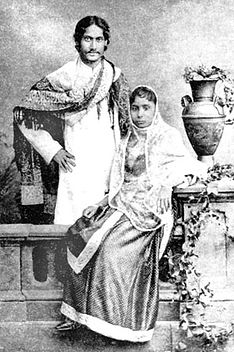Rabindranath Tagore
Rabindranath Tagore (7 May 1861 – 7 August 1941), also known as Rabi Thakur, was a Bengali philosopher, poet, and winner of the Nobel Prize for literature in 1913.
Tagore saw unity with nature as the highest stage of human evolution.

Love is the ultimate meaning of everything around us. It is not a mere sentiment; it is truth; it is the joy that is at the root of all creation.
Man is not entirely an animal. He aspires to a spiritual vision, which is the vision of the whole truth. This gives him the highest delight, because it reveals to him the deepest harmony that exists between him and his surroundings.
In love all the contradictions of existence merge themselves and are lost. Only in love are unity and duality not at variance. Love must be one and two at the same time
In love, at one of its poles you find the personal, and at the other the impersonal. At one you have the positive assertion — Here I am; at the other the equally strong denial — I am not. Without this ego what is love? And again, with only this ego how can love be possible?
Compulsion is not indeed the final appeal to man, but joy is. And joy is everywhere; it is in the earth's green covering of grass; in the blue serenity of the sky; in the reckless exuberance of spring; in the severe abstinence of grey winter; in the living flesh that animates our bodily frame; in the perfect poise of the human figure, noble and upright; in living; in the exercise of all our powers; in the acquisition of knowledge; in fighting evils; in dying for gains we never can share. Joy is there everywhere; it is superfluous, unnecessary; nay, it very often contradicts the most peremptory behests of necessity. It exists to show that the bonds of law can only be explained by love; they are like body and soul. Joy is the realisation of the truth of oneness, the oneness of our soul with the world and of the world-soul with the supreme lover.
That side of our existence whose direction is towards the infinite seeks not wealth, but freedom and joy. There the reign of necessity ceases, and there our function is not to get but to be. To be what? To be one with Brahma. For the region of the infinite is the region of unity. Therefore the Upanishads say: If man apprehends God he becomes true. Here it is becoming, it is not having more. Words do no gather bulk when you know their meaning; they become true by being one with the idea.
But the highest wisdom in the East holds that it is not the function of our soul to gain God, to utilise him for any special material purpose. All that we can ever aspire to is to become more and more one with God. In the region of nature, which is the region of diversity, we grow by acquisition; in the spiritual world, which is the region of unity, we grow by losing ourselves, by uniting. Gaining a thing, as we have said, is by its nature partial, it is limited only to a particular want; but being is complete, it belongs to our wholeness, it springs not from any necessity but from our affinity with the infinite, which is the principle of perfection that we have in our soul.
Knowledge is partial, because our intellect is an instrument, it is only a part of us, it can give us information about things which can be divided and analysed, and whose properties can be classified part by part. But Brahma is perfect, and knowledge which is partial can never be a knowledge of him.




No comments:
Post a Comment